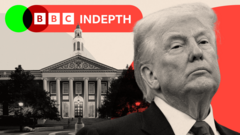WASHINGTON (AP) — For a generation of young Americans, choosing where to go to college or whether to go at all has become a complex calculation of costs and benefits that often revolves around a single question: Is the degree worth its price? Public confidence in higher education has plummeted in recent years amid high tuition prices, skyrocketing student loans, and a dismal job market — compounded by ideological concerns from conservatives. Consequently, colleges are scrambling to prove their value to students.
The concept of 'return on investment' has proliferated college advertisements nationwide, with new rankings emerging to grade campuses based on the financial benefits they offer. States like Colorado have started providing reports on the monetary benefits of college, while Texas includes it in its funding calculations for community colleges.
Despite doubts regarding their value, research indicates that a bachelor’s degree typically pays off in the long run. The Strada Education Foundation recently reported that 70% of public university graduates can expect a positive return within ten years, but the figures vary widely by state — from 53% in North Dakota to 82% in Washington, D.C.
Families are increasingly hesitant to take on debt for higher education. High school counselor Emilia Mattucci from Pittsburgh highlights this shift as students from low-income families opt for technical schools or trades, fearing the debt burden.
Education Secretary Linda McMahon has echoed similar sentiments, suggesting not every student needs a four-year degree to achieve success. This perspective reflects a growing recognition that the job market is evolving and not all degrees guarantee employability.
Colleges face a dual challenge: managing tuition costs and ensuring graduates have the skills employers demand. Tuition rates have remained stable at many institutions to address affordability, while college leaders are striving to align degree programs with actual workforce needs.
However, a disconnect between college education and job market demands persists. Data reveals 52% of recent graduates hold jobs that don't require a degree, even in fields like education and nursing. Legislative efforts are aiming to rectify these issues by pushing for transparency in graduate earnings and leveraging federal funding to incentivize colleges effectively.
Amid rising scrutiny, colleges are beginning to appreciate the importance of presenting prospective students with detailed data about job prospects and graduate outcomes. Chancellor Lee Roberts from UNC-Chapel Hill emphasizes that, in uncertain times, students rightly focus on potential job outcomes, leading institutions to prioritize providing this critical information.
The concept of 'return on investment' has proliferated college advertisements nationwide, with new rankings emerging to grade campuses based on the financial benefits they offer. States like Colorado have started providing reports on the monetary benefits of college, while Texas includes it in its funding calculations for community colleges.
Despite doubts regarding their value, research indicates that a bachelor’s degree typically pays off in the long run. The Strada Education Foundation recently reported that 70% of public university graduates can expect a positive return within ten years, but the figures vary widely by state — from 53% in North Dakota to 82% in Washington, D.C.
Families are increasingly hesitant to take on debt for higher education. High school counselor Emilia Mattucci from Pittsburgh highlights this shift as students from low-income families opt for technical schools or trades, fearing the debt burden.
Education Secretary Linda McMahon has echoed similar sentiments, suggesting not every student needs a four-year degree to achieve success. This perspective reflects a growing recognition that the job market is evolving and not all degrees guarantee employability.
Colleges face a dual challenge: managing tuition costs and ensuring graduates have the skills employers demand. Tuition rates have remained stable at many institutions to address affordability, while college leaders are striving to align degree programs with actual workforce needs.
However, a disconnect between college education and job market demands persists. Data reveals 52% of recent graduates hold jobs that don't require a degree, even in fields like education and nursing. Legislative efforts are aiming to rectify these issues by pushing for transparency in graduate earnings and leveraging federal funding to incentivize colleges effectively.
Amid rising scrutiny, colleges are beginning to appreciate the importance of presenting prospective students with detailed data about job prospects and graduate outcomes. Chancellor Lee Roberts from UNC-Chapel Hill emphasizes that, in uncertain times, students rightly focus on potential job outcomes, leading institutions to prioritize providing this critical information.



















